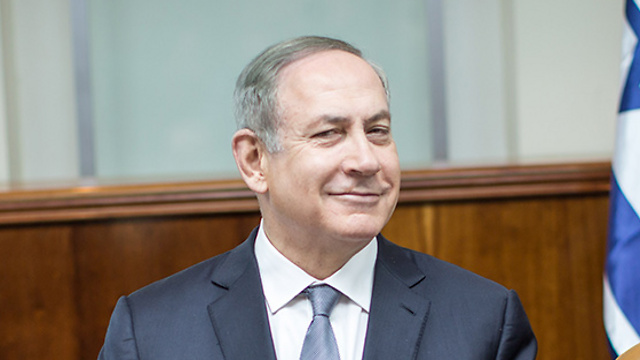Breaking down Netanyahu's US visit: a conspiracy theory
Analysis: While the right sees PM Netanyahu's upcoming meeting with US President Trump as a golden opportunity to annex the West Bank, Netanyahu seems to view it as a chance to weaken his current rival, Education Min. Bennett, by drawing attention to an old favorite of his—Iran.
Three weeks ago, in a formal ceremony, the Castel Tunnels where opened. They are not really tunnels, but an 800-meter underground passage. And yet the prime minister and the Transportation minister made it a point to come and cut the ribbon. Netanyahu said at the ceremony that the opening of the tunnels is “a historic event, because the road to Jerusalem, Israel’s Capital, has never been shorter”.
As it turns out, the road to Jerusalem did not become shorter at all. Quite the opposite. It has become longer, especially during rush-hour, when the alternative route is laid siege by tens of thousands of residents of Mevaseret Zion. If the road does get shorter, it will only be in a few months. So, in short, while the ceremony definitely took place, history is still a long way coming.
This story is analogous to Netanyahu’s upcoming first visit to Donald Trumps’ White House. Netanyahu is not the first foreign leader to come to Washington: since his inauguration, Trump has met with British Prime Minister Theresa May and Japanese Prime Minister Shinzo Abe. He has also held a short, improvised meeting with Abdallah, King of Jordan, and spoken on the phone with other leaders, most notably Russian President Vladimir Putin and Chinese President Xi Jinping.
These meetings left behind a thin trail of embarrassment, as well as a lot of unanswered questions. On the more embarrassing side, one can recall the never-ending hand shake Trump forced on Japanese Prime Minister Abe, and the ignorance he demonstrated in his conversation with Russian President Putin regarding the Nuclear Weapons Limitation Treaty. His phone conversation with the Chinese president was more significant. Following his election, Trump immediately signaled his plans to renounce the “One China” policy and recognize Taiwan as an independent state. This move was interpreted as a declaration of war against China. He later abruptly recanted, and the issue then evaporated.
All of this nevertheless left a bad impression. Trump is improvising, or worse—moonlighting. His administration does not have a consistent foreign policy. Instead, his position zigzags, like a drunk driver, between different advisors, contradictory views and ideas. The only common denominator is his wish to change things. To impress. To make some noise. However, with the Israeli Prime Minister’s visit, some preliminary preparation was carried out: Netanyahu’s people, Israeli Ambassador to the US Ron Dermer and other Israeli delegates met with Trump’s staff. Following these meetings, agreements were drawn up on paper, for Trump to read.
On the eve of this meeting, Trump himself met with Sheldon Edelson, who invested $120 million in his election campaign and the campaign of his party, and is investing huge amounts in promoting Netanyahu. The timing was no coincidence: Trump understands the connection. He knows that he and Netanyahu are both stuck, side by side, in Edelson’s wallet. Two credit cards in the same rich-man’s pocket. The feverish activity bore surprising results: next to the general, noncommittal declarations of love to Israel and a retroactive criticism of Obama’s attitude toward Israel, the White House and Trump himself state explicit objections to the settlements ' expansion. They postpone the fulfillment of campaign promises, including pledges to move the US Embassy to Jerusalem and dismantle the nuclear treaty. They dilly-dally with the nomination of David Friedman, the settlement-loving ambassador. All this takes place under Trump of all people, and now of all times.
I have a theory that may explain this turnabout. A conspiracy theory. I do not have concrete evidence to support, only circumstantial evidence: following Netanyahu’s request, expectations from the neeting were lowered. In fact, this is the same gesture Trump had made before the two leaders' meeting.
Netanyahu is in the middle of a complicated battle with Bennet, as well as other ministers from his own Likud party. This group considers Trump’s nomination a once-in-a-lifetime opportunity to annex the West Bank. Netanyahu is afraid of announcing the annexation and even more afraid of Bennet gaining political power. He is grasping onto the status-quo, and needs the American president to back him up. Any accomplishments to come out of his visit Netanyahu will credit them to himself, and not the pressure of the Settlers’ lobby. It was no coincidence that during a government meeting, Netanyahu said that his main interest in this visit—as opposed to those of others, meaning Bennet and the Likud ministers—is to strengthen Israel's security. Strengthening security is code for attaining a declaration on Iran: Iran in, Bennet out.











